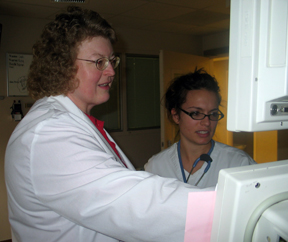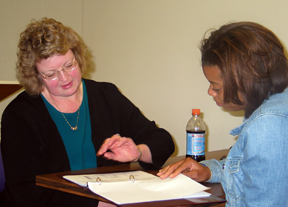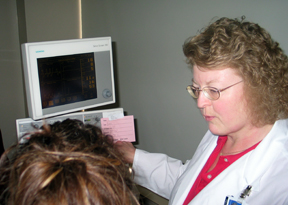 In her clinical teaching, Louise LaFramboise, Ph.D., always emphasizes the person in the bed.
In her clinical teaching, Louise LaFramboise, Ph.D., always emphasizes the person in the bed.
Calm in critical care situations, she helps students develop their critical reasoning and interpersonal skills with patients who are critically ill.
She shows compassion and commitment to those most vulnerable, even developing simulations to help students with the difficult scenario of a dying patient.
For her exceptional teaching skills, Dr. LaFramboise will receive the UNMC Outstanding Teaching Award during Tuesday’s Annual Faculty Meeting, which begins at 4 p.m. in the Durham Research Center auditorium.
|
|
Ironically, Dr. LaFramboise had no role model when she decided to become a nurse in the eighth grade. “I knew nothing about nursing and had no medical professionals in my family,” she said. “I just knew I didn’t want to teach.It turns out I love teaching.”
As an assistant professor in the Adult Health and Illness Department, Dr. LaFramboise arrives at her fifth-floor office each day at 5:30 a.m. to prepare for senior nursing courses, provide clinical supervision of students in the intensive care unit or propel her research on family caregivers of heart failure patients.
“What I love most is watching the student grow,” said Dr. LaFramboise, who joined the faculty in 1986. “The growth over the course of the semester is phenomenal to watch. I’m right there with them in the ICU, but toward the end of the semester they don’t need you as much and you need to trust them. It’s like letting them go out on their first date without a GPS locator. You have to let them grow into that independence.”
 And she does, watching them integrate the classroom content into the clinical setting. “It’s encouraging to see them grow into an advocate for the patient,” she said.
And she does, watching them integrate the classroom content into the clinical setting. “It’s encouraging to see them grow into an advocate for the patient,” she said.
“Dr. LaFramboise sets clear standards of performance that are high and then works diligently to help each and every student meet the standard,” said Catherine Todero, Ph.D., associate dean-undergraduate programs for the College of Nursing and one of several faculty who nominated her for the award.
Although research is important, teaching comes first, Dr. LaFramboise said. “If I have class or clinicals or papers to grade, that rises to the top and you squeeze the rest of the time as much as you can for research.”
At the beginning of clinical rotations, Dr. LaFramboise explains her ideas for student professionalism through a talk she routinely gives on the five C’s of a caring professional:
- Compassion – Talking to patients so they know they are not alone, a feeling Dr. LaFramboise remembers after a childhood bicycle accident sent her to the hospital.
- Competence – Know as much as you can about your patient, she says.
- Confidence – She tells students: “In front of the patient, I don’t care if you are jelly inside. You need to act and look like you know what you’re doing.”
- Conscience – Never do anything ethically or morally wrong, she says. “Always advocate for the patient. They’ve entrusted so much to health professionals.”
- Commitment – Be present in the moment with that patient, she says. Mistakes happen most when people are not focused.
Dr. LaFramboise serves as co-director of the recently developed Accelerated Nursing Program, as well as the faculty adviser. She must establish a rapport with students quickly since they are in the program for only one year. “Judging from the follow-up e-mail she regularly receives from the first class of graduates, I would say she is quite successful,” Dr. Todero said.
 The critical care course she teaches is essential to transitioning graduating seniors to the professional role. It also is a predictor of success on the National Council of State Boards of Nursing’s NCLEX exam, which is the first step in the nurse licensure process. “As such, the course plays a critical role in the curriculum of the College and is entrusted to only the most skilled educators in our College,” Dr. Todero said.
The critical care course she teaches is essential to transitioning graduating seniors to the professional role. It also is a predictor of success on the National Council of State Boards of Nursing’s NCLEX exam, which is the first step in the nurse licensure process. “As such, the course plays a critical role in the curriculum of the College and is entrusted to only the most skilled educators in our College,” Dr. Todero said.
Dr. LaFramboise often draws on her nursing experience, sharing actual scenarios and leading students through the critical thinking steps to arrive at a nursing intervention. Said Brenda Weidner, a former undergraduate student who is now a pediatric critical care nurse: “I know that five years from now I will not remember many facts I memorized in nursing school, but I will never forget the information I learned through Dr. LaFramboise.”
Dr. LaFramboise worked fulltime in the medical surgical area at the former St. Joseph Hospital in Omaha for five years, before taking an on-call position at St. Joseph Hospital in Fort Worth, Texas. When she returned to Nebraska, she returned to St. Joseph as an on-call nurse in the medical-surgical and critical care areas. In 1987, she did on call work at UNMC’s Adult Intensive Care Unit.
Despite her childhood proclamation that she’d never teach, Dr. LaFramboise returned to Nebraska ready to step in the classroom. “I felt UNMC should be the premier nursing institution in the state,” she said. “It was almost an unspoken goal but lots of us here felt that and pushed the envelope to make our students sought after.”
Today, they are.
And Dr. LaFramboise, who received the 2004 Adult Health and Illness Department Teacher of the Year Award, is one reason why.